Phil Kerpen: Farm bill should reform more than food stamps

Republicans are set to move landmark welfare reform in this year’s farm bill, which includes language requiring able-bodied adults to work or participate in a job training program to be eligible for food stamps. Democrats in Congress, however, have decided to litmus test opposition to work requirements and have therefore walked away en masse from supporting the usually bipartisan farm bill. That gives conservatives leverage to push for free-market reforms to the other 20 percent of the bill – and they should. The food stamp program accounts for about 80 percent of the cost of the farm bill, and work requirements are overwhelmingly popular with the public. They enjoy a robust 82 percent approval among all voters and are supported by even 71 percent of Democrats according to a recent poll commissioned by the Foundation for Government Accountability. If the farm bill accomplished nothing else, it would be worth supporting for this popular, critical reform that would incentivize Americans to reenter the workforce and get back on the ladder of economic opportunity – while helping grow an economy that is being held back by chronic shortages of workers in many industries. But a farm bill that reforms the food stamp program while reauthorizing farm welfare programs without reforms – and in some cases even with expansions – is an unnecessary political gift to Democrats, who can spin their opposition to sensible work requirements by accusing Republicans of hypocrisy. The bill loosens the loophole that allows non-farmers to collect agricultural subsidies of up to $125,000 per year. Current law allows immediate family members of farmers to collect even if they don’t live on the farm – the proposed farm bill expands the definition to include urban-dwelling cousins, nieces, and nephews. And they aren’t required to work to collect the money. And commodity support programs are available for couples making up to $1.8 million per year – hardly the needy – rather than following the much more sensible proposal in President Trump’s budget to cap eligibility at $500,000. The bill also reauthorizes the Soviet-style sugar program, which the great anti-cronyism writer Tim Carney has accurately identified as a test of whether Republicans “understand the distinction between pro-business and pro-market.” The sugar program is a hidden tax of $2.4 to $4 billion per year according to an analysis by the American Enterprise Institute – and it pushes candy companies to move to Mexico so they can buy sugar at the much lower world price. Census Bureau estimates show the sugar program has destroyed about 123,000 American jobs. But it continues because the sugar industry is politically powerful, especially in the key state of Florida. There might be enough votes in the House to reform the sugar program, but we won’t find out unless leadership allows a vote. Ultimately, conservatives may find it impossible to resist voting for a bill with a key policy reform (work requirements) applied to the single program (food stamps) that accounts for 80 percent of farm bill spending. But if they can use the leverage gained from Democrats walking away from the table to force reforms on the farm side of the bill they will achieve an even bigger victory while saving leadership from an obvious political vulnerability created by the current bill. ### Philip Kerpen is an American free-market policy analyst and political organizer, president of American Commitment, a conservative organization he founded in 2012.
Birmingham city council looks to expand parking meter payment options

The Birmingham City Council is looking into expanding payment options for the city’s 4,500 parking meters. Members of the Birmingham, Ala. community are very familiar with being put in a situation where they are desperately pulling together change from their purses, wallets, cars and pockets to feed the meter. But in some parts of the city, scrounging up $0.50 will only buy you 30 minutes; if the meter expires before you get back, you might find a $15 parking ticket on your windshield. That’s why Chairman of the Birmingham transportation committee and city Councilman Darrell O’Quinn is exploring new mobile payment methods to pay for parking meters. In early April, O’Quinn met with two companies to investigate new payment methods. O’Quinn met with Parkmobile LLC, a mobile app that allows users to pay for parking meters using credit cards or pre-loaded funds, and Paybyphone; another mobile app which allows users to pay using not only their mobile device, but would also allows parkers to call a 1-800 number posted on a meter, or a nearby kiosk, and respond to the payment prompts. O’Quinn told Bham Now that Parkmobile doesn’t usually charge municipalities for its service model. If you make it easier to pay for parking, more people will pay; and more payment options could mean more revenue for the city, O’Quinn told NPR. According to city officials, nearly 40 percent of parking tickets distributed don’t get paid, resulting in thousands of dollars in uncollected parking fines every year. Broken meters, another source of lost income for the city, would also be subject to the new payment methods, if instituted. O’Quinn plans to test these electronic payment options over the next few months in hopes of getting good feedback from residents before the city makes any changes.
ASU names Darrell Hudson Chairman of Board of Trustees, Brenda Brown Hunter Vice-Chair
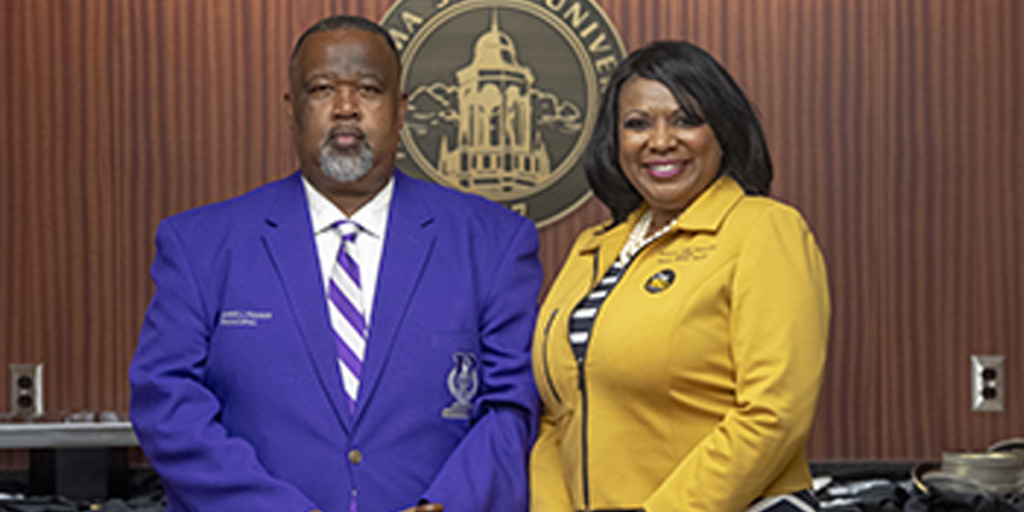
The Alabama State University Board of Trustees has a new chairman. Darrell Hudson was elected by a vote of 9 to 5 to serve as head of the Board. The vote came as former chairwoman Alfreda Green’s term ended. Trustee Green had announced that she would not seek re-election to the position. “I want to thank everybody in this room, those at this table and the entire university for their support during my tenure,” said Green. “Everyone was so wonderful to me. I thoroughly enjoyed every moment and enjoyed very opportunity that I had to serve this University. I will continue in my ‘non-chair’ position as a trustee. I will do whatever I can to support the new chair, this Board and Alabama State University.” Green received high praise from the new chairman, several of her fellow Board members and from President Quinton T. Ross, Jr. “You were my first chair, and I wanted to stand and tell you thank you for the leadership and guidance that you have provided for me, this Board and for Alabama State University,” Ross said following the ceremonial passing of the gavel from Trustee Green to Trustee Hudson. Hudson has served on the Board for three years. “This is a great honor,” said Hudson. “I am humbled that my fellow board members have entrusted this position to me. I want to continue to move The Alabama State University forward and work with President Ross to ensure that our students receive the best possible education at our University. I do want to say that the ‘buzz is back’ at ASU, and we’re moving in the right direction.” Just minutes after being elected as chairman, Hudson assumed his new position and presided over the rest of the Board meeting which included the election of Trustee Brenda Brown Hunter as vice chairman. Trustee Angela McKenzie had served in that position for several years and also was praised for her work on behalf of the University.
Rusty Glover: Education is key to Alabama’s future

As a former high school educator my time in the classroom gave me many valuable life lessons. Not a single year passed where I did not see the effects that cuts had on our students, their achievements, and even their parents. While we are beginning to see an economic renaissance nationally, the figures from the latest hard data in 2016 show just how slow the recovery was for many people. In my own area of Southwest Alabama, the most recent figures show an underemployment rate of 23.7% – nearly 1 in 4 people are looking for better jobs and are willing to commute longer distances for those jobs. Yet, of the five fastest growing occupations in the same area – four of the occupations can either be taught or outright require a community or technical college training. Education will be part of the next legislative session. In a time when it seems everything is in flux – education and its impact on our communities remains a constant. In a 2017 article, it was reported that of 67 counties – 18 had either local school systems or colleges as the county’s largest employer. It should be noted, that of the top eight counties for population – the largest employer in six of them are education institutions or school systems. However, what is our plan? I never taught without planning my own lessons. How then can we effectively seize our future without a plan? What I propose is to get back to the basics. Greater localized control, while working with every school system in the state to reduce classroom sizes can help our children quickly. For those in high schools, I pledge to work and develop more streamlined pathways to community and technical college training. Increasing access to broadband at the same time will allow students across the state to take advantage of our higher education resources in a quick, thorough, and efficient fashion. This can deliver to Alabama both the higher personal incomes and long term tax base our state needs – without raising personal taxes. As your Lieutenant Governor, I would bring the perspective of a teacher – one who understands what cuts to education looks like at the dinner table and who understands the importance of education to our local communities. ••• Rusty Glover is a native of Mobile, Ala. He has served in the Alabama Legislature for 16 years as a member of Alabama House of Representatives (2002-2006) and Senate (2006-present). Glover is a graduate of B.C. Rain High School, Faulkner State Community College and the University of South Alabama. He retired after 25 years of teaching from Mary G. Montgomery High School in Semmes, where he lives with his wife, Connie. Together they have two daughters, Kellie and Katie; a son-in-law, John McGraw; and a new grandson, Beau Monroe McGraw. He is a member of Wilmer Baptist Church in Wilmer, AL. Visit rustyglover.com to learn more.
Board of Education approves new superintendent Eric Mackey’s contract
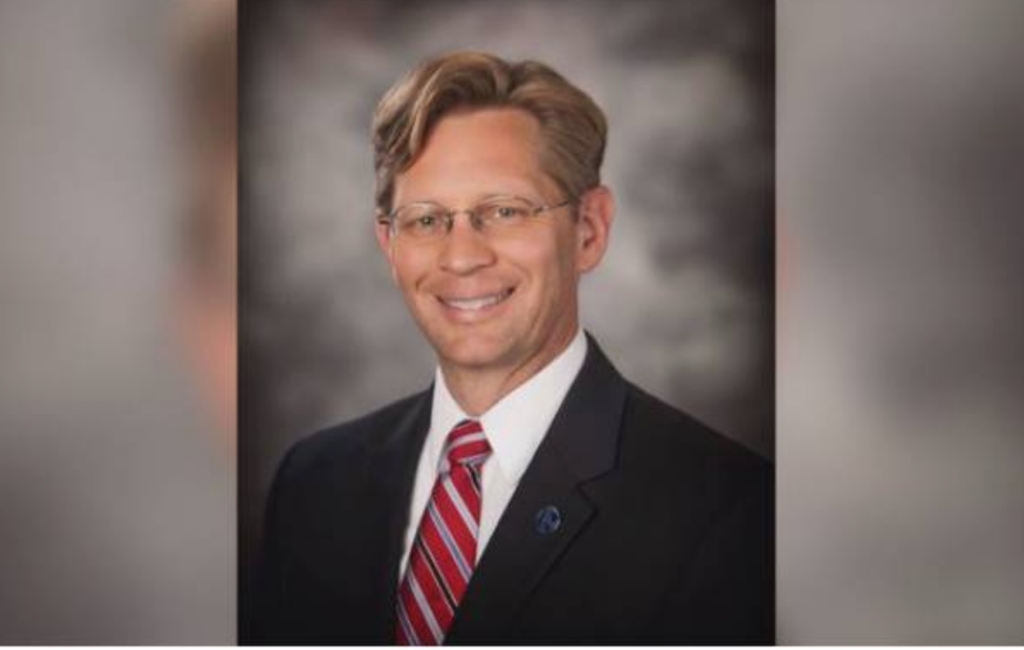
The Alabama Board of Education approved new State Superintendent, Eric Mackey‘s compensation package and contract worth $311,000 on Thursday with a 7 to 2 vote. Mackey, who beat out Hoover City Schools Superintendent Kathy Murphy and Jefferson County Superintendent Craig Pouncey for the position in late April, starts on Monday. The contract details include a base salary of $245,000 a year for the initial three-year term, a $21,000 annual housing allowance, state-owned vehicle for official travel, reimbursement of up to $5,000 for professional development activities annually, and professional association dues. Mackey will also receive a 3 percent raise each year starting in 2019, unless the board votes against it. Board of Education Vice President, Montgomery Republican Stephanie Bell and board member, Montgomery Democrat Ella Bell were the two board members who voted no to Mackey’s contract. Stephanie Bell told AL.com that the contract was not taxpayer-friendly, and gave too much control to Mackey and not enough to the board. Ella Bell said she did not agree with the amount of the raise, stating that teachers will only be receiving a 2.5 percent raise next year. Another point of dissatisfaction from Bell was that the contract does not require and annual evaluation. She said the evaluation should be required, while other board members said the decision should be made year by year. If the board does find fault with Mackey’s performance, they must make a specific proposal for changes. Mackey has an extensive background in education, serving as a former teacher, principal and city superintendent, and has been serving as the executive director of the School Superintendent Association of Alabama since 2010.
Second Democratic senator publicly backing Donald Trump’s CIA pick
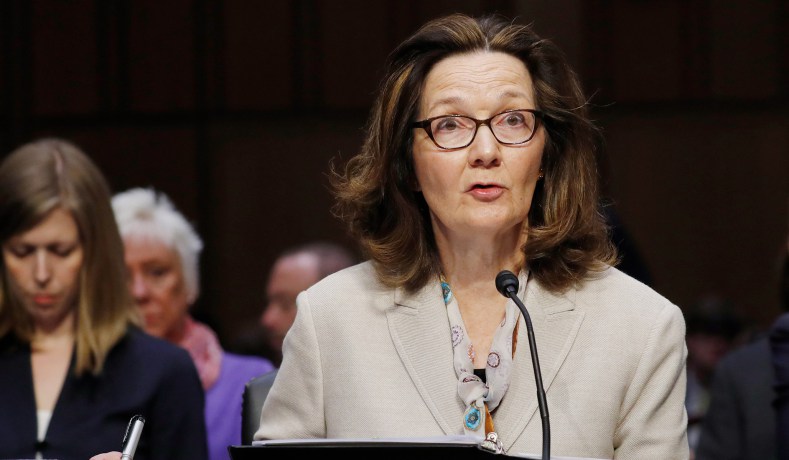
A second Democratic senator has announced his support for President Donald Trump’s CIA nominee. Joe Donnelly of Indiana says in a statement Saturday that he made his decision after “a tough, frank and extensive discussion” with Gina Haspel, the spy agency’s acting director. The other Democrat who’s come out for Haspel is West Virginia’s Joe Manchin. Both Democrats are considered to be among the most vulnerable Senate incumbents in the November election. So far two Republicans have announced their opposition to Haspel: Kentucky’s Rand Paul and Arizona’s John McCain, who’s battling cancer and isn’t expected to be present for the voting. Supporters are pushing for votes by the Senate intelligence committee and the full Senate before the Senate’s Memorial Day break. The GOP holds a 51-49 edge, and Vice President Mike Pence can break a possible tie. Haspel has run into criticism because she was once involved in the CIA’s harsh interrogation program. “I believe that she has learned from the past, and that the CIA under her leadership can help our country confront serious international threats and challenges,” Donnelly says in the statement. Donnelly came under attack from Trump at a rally in Indiana on Thursday, two days after the state’s primary election determined that his Republican opponent in November will be former Indiana lawmaker Mike Braun. Trump, who was joined at the rally by Vice President Mike Pence, a former Indiana governor, urged GOP voters to mobilize and prevent Democrats from regaining control of Congress. The president called Donnelly “Sleepin’ Joe” and criticized the senator for opposing his tax plan and attempt to end the Affordable Care Act. Donnelly responded by saying “problems only get solved when you roll up your sleeves and put in the hard work,” and his campaign said he had voted with Trump 62 percent of the time. Republished with permission from the Associated Press.
Law enforcement officer suggests Sue Bell Cobb apologize, ask for forgiveness
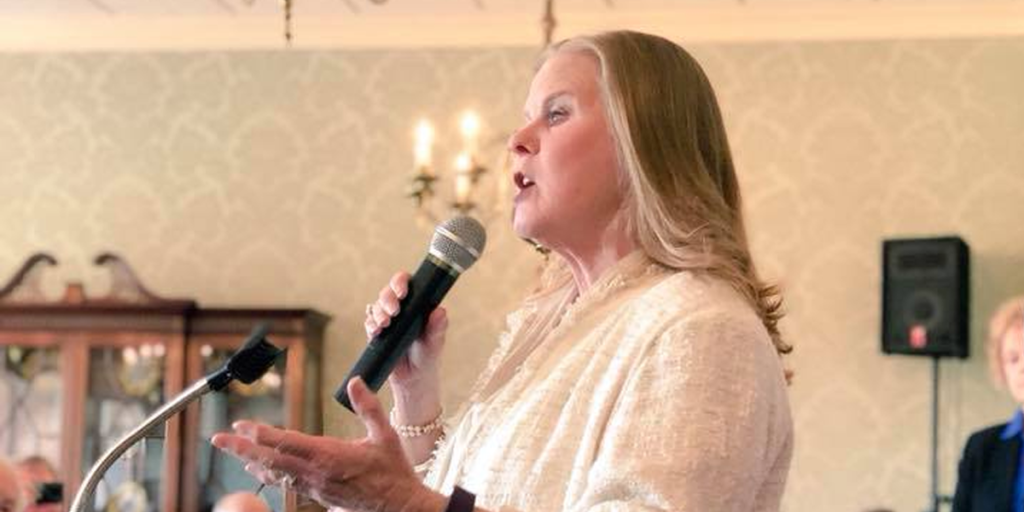
The chief deputy with the Jefferson County Sheriff’s Office is asking former Alabama Chief Justice and Democratic gubernatorial hopeful Sue Bell Cobb for an apology. Randy Christian, chief deputy with the Jefferson County Sheriff’s Office, said Cobb should apologize in the wake of her hiring and defending a campaign staffer, Paul Littlejohn III who was arrested Friday for violating the state’s Sex Offender Registration and Notification Act (SORNA). “He was doing his job, plain and simple, and doing it well,” Christian said in a statement to AL.com. “How sad that a candidate for governor supports a convicted sex offender over sexual assault victims.” “She also apparently doesn’t support law enforcement doing the difficult job of ensuring through compliance of the sex offender registration law that no other victim comes in harm’s way. That is the sole reason for the law’s creation,” Christian continued. “It’s not just shameful, it’s disgusting desperation on her part. If I’m reading this right, she wanted us to just look the other way. If she has any integrity left, she will apologize to law enforcement, sexual assault victims and ask for forgiveness.” Littlejohn, is a former inmate at the Draper Correctional Facility in Elmore County where he spent 30 years following his 1984 conviction for three crimes: rape by forcible compulsion, sodomy I and robbery I. Court records indicate Littlejohn was convicted of raping a 20 year old female and sodomizing a 30 year old female. On Wednesday the Jefferson County Sheriff’s Department was notified he was in violation of SORNA as he was working as a pastor at Greater Shiloh Missionary Baptist Church, which also runs a daycare and is near a school. As a registered sex offender, Littlejohn is prohibited from both living and working near an elementary school or daycare. Littlejohn failed to disclose this information to the sex offender registry. Violation of SORNA is considered a felony. Even after Littlejohn’s arrest, Cobb continued to defend him calling the arrest “politically motivated.” Cobb says the Jefferson County Sheriff’s Office is led by a Republican, and that the arrest was made because Republicans don’t want to face her in the general election.
Michael Bloomberg warns of ‘epidemic of dishonesty’
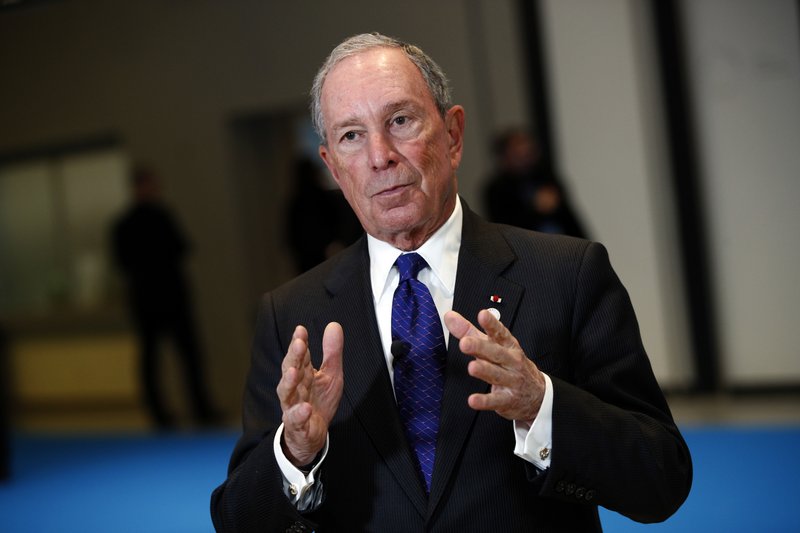
Americans are facing an “epidemic of dishonesty” in Washington that’s more dangerous than terrorism or communism. That’s according to former New York City Mayor Michael Bloomberg, who warned in a commencement speech on Saturday at Texas’ Rice University that “an endless barrage of lies” and a trend toward “alternate realities” in national politics pose a dire threat to U.S. democracy. The 76-year-old billionaire, who flirted with an independent presidential run in 2016, did not call out any politicians by name. Although he derided Donald Trump as “a con” and a “dangerous demagogue” before his election, in an interview before the speech Bloomberg refused to comment specifically on the Republican president’s troubled history with the truth. Fact checkers have determined that Trump has made hundreds of false and misleading statements since entering the Oval Office. “This is bigger than any one person. It’s bigger than any one party,” he said in the interview. In the speech, Bloomberg evoked the legend of the nation’s first president, George Washington, who as a boy said he could not tell a lie when asked if he cut down a cherry tree. “How did we go from a president who could not tell a lie to politicians who cannot tell the truth?” Bloomberg asked Rice graduates and their families gathered in Houston. He blamed “extreme partisanship” for an unprecedented tolerance of dishonesty in U.S. politics. People are committed more to their political tribes than the truth, he said, suggesting that the nation is more divided than any time since the Civil War. “There is now more tolerance for dishonesty in politics than I have seen in my lifetime,” Bloomberg said. “The only thing more dangerous than dishonest politicians who have no respect for the law is a chorus of enablers who defend their every lie.” For example, he noted that Democrats spent much of the 1990s defending President Bill Clinton against charges of lying and personal immorality just as Republicans attacked the lack of ethics and honesty in the White House. Just the reverse is happening today, he said. In one jab at Trump, he noted that the vast majority of scientists agree that climate change is real. Trump and his Republican allies have repeatedly called climate change a hoax promoted by America’s adversaries. “If 99 percent of scientists whose research has been peer-reviewed reach the same general conclusion about a theory, then we ought to accept it as the best available information — even if it’s not a 100 percent certainty,” Bloomberg said. He added: “That, graduates, is not a Chinese hoax.” He warned that such deep levels of dishonesty could enable what he called “criminality.” Asked what specifically he was talking about, Bloomberg noted “lots of investigations” going on, but he declined to be more specific. Several Trump associates are facing criminal charges as part of a federal probe into Russia’s meddling in the 2016 election. Three have already pleaded guilty to making false statements to the FBI. Federal investigators want to interview Trump himself, although the president’s legal team has resisted so far. “When elected officials speak as though they are above the truth, they will act as though they are above the law,” Bloomberg told Rice graduates. “And when we tolerate dishonesty, we get criminality. Sometimes, it’s in the form of corruption. Sometimes, it’s abuse of power. And sometimes, it’s both.” “The greatest threat to American democracy isn’t communism, jihadism, or any other external force or foreign power,” he continued. “It’s our own willingness to tolerate dishonesty in service of party, and in pursuit of power.” Republished with permission from the Associated Press.
Mike Pompeo: NKorea needs US security assurances for nuke pact

The United States is offering assurances to North Korea’s Kim Jong Un as it seeks to put in motion the potential for a sweeping nuclear deal ahead of President Donald Trump’s upcoming summit with the North Korean leader. Secretary of State Mike Pompeo said the U.S. will need to “provide security assurances” to Kim if they’re able to forge an agreement. Pompeo met with Kim last week in North Korea, helping set the stage for Trump’s historic meeting with Kim in Singapore on June 12. Trump has set an ambitious goal for North Korea to get rid of its nuclear weapons in a permanent and verifiable way. In return, the U.S. is willing to help the impoverished nation strengthen its economy. Pompeo was asked on “Fox News Sunday” whether the U.S. was in effect telling Kim he could stay in power if he met the U.S. demands. Pompeo said: “We will have to provide security assurances, to be sure.” The top U.S. diplomat did not elaborate, but his comment could refer to the type of assurances North Korea has sought in the past. A statement issued during international negotiations with North Korea in 2005 over its nuclear weapons development said the “United States affirmed that it has no nuclear weapons on the Korean Peninsula and has no intention to attack or invade (North Korea) with nuclear or conventional weapons.” The North has said it needs nuclear weapons to counter what it believes is a U.S. effort to strangle its economy and overthrow the Kim government. “Make no mistake about it, America’s interest here is preventing the risk that North Korea will launch a nuclear weapon into L.A. or Denver or to the very place we’re sitting here this morning,” Pompeo said from Washington. “That’s our objective, that’s the end state the president has laid out and that’s the mission that he sent me on this past week, to put us on the trajectory to go achieve that.” Pressed in a separate interview on whether the U.S. would seek regime change, Pompeo said “only time will tell how these negotiations will proceed.” “The president uses language that says ’we’ll see,’” Pompeo told CBS’s “Face the Nation.” ″The American leadership under President Trump has its eyes wide open.” North Korea said Saturday that all of the tunnels at the country’s northeastern nuclear test site will be destroyed by explosion in less than two weeks, ahead of Kim’s summit with Trump. Observation and research facilities and ground-based guard units will also be removed, the North said. Pompeo praised it as “one step along the way.” John Bolton, the president’s national security adviser, described the types of steps that North Korea would need to take as part of a denuclearization process, including the potential involvement of a processing center in Tennessee. “The implementation of the decision means getting rid of all the nuclear weapons, dismantling them, taking them to Oak Ridge, Tennessee,” Bolton said in an interview with ABC’s “This Week.” ″It means getting rid of the uranium enrichment and plutonium reprocessing capabilities,” adding the process would also need to address North Korea’s ballistic missiles. “I don’t think anybody believes you’re going to sign the complete ending of the nuclear program in one day. But we are also very much interested in operationalizing the commitment as quickly as possible,” Bolton said. Bolton said in an interview with CNN’s “State of the Union” that North Korea should not “look for economic aid from us. I think what the prospect for North Korea is to become a normal nation, to behave and interact with the rest of the world the way South Korea does.” “The prospect for North Korea is unbelievably strong if they’ll commit to denuclearization. That’s what the president is going to say,” he said. Pompeo said private-sector Americans could help rebuild North Korea’s energy grid and develop the country’s infrastructure. He described the possibility of American agriculture being used to “support North Korea so they can eat meat and have healthy lives.” South Korea has said Kim has shown an interest in dealing away his nuclear weapons in return for economic benefits. But it remains unclear if Kim would ever fully relinquish the weapons he probably views as his only guarantee of survival. Republished with permission from the Associated Press.
Bradley Byrne: A standing ovation for teachers

Teachers hardly get the credit they deserve for the challenging jobs they do every day. Not only do they educate our children, but teachers also provide guidance, support, and serve as positive role models for the next generation. Their efforts and sacrifices should not go unnoticed. I have dedicated a good part of my life to improving education in our community. From my time on the Alabama State School Board to serving as chancellor of Alabama’s two-year college system, I have spent a fair amount of time in classrooms throughout Alabama. As a Congressman, I serve on the House Education and the Workforce Committee, which has jurisdiction over K-12 education. In each of these roles, I have interacted with the many teachers, support staff, and administrators who keep our schools running. The dedication of these men and women on a daily basis is impressive, though they rarely get the attention they deserve. Without fail, I always leave these visits with a greater appreciation for the work our teachers do and the challenges they face each day. Just last week, we celebrated Teacher Appreciation Week, a time when we take extra steps to show our support for the educators who make a living prioritizing our children’s futures. Whether it is simply saying an extra “thank you” or treating a teacher to a special gift, this week is all about displaying our appreciation for the work they do year-round. Ultimately, teachers educate our students so they may have bright and successful futures. In fact, it is often teachers who make the biggest impression on our young students. Be it teachers in the classroom, coaches on the school sports team, or faculty keeping activities running smoothly, these leaders play a significant role in our students’ lives. Very few professions can totally alter the course of someone’s life like a teacher can. Personally, this week gives me time to reflect on the meaningful figures I have had throughout my life. I always think of Ms. Kay Ladd, my first grade teacher who taught me how to read. As such an integral part of my childhood, she will be forever in my thoughts as one of the most remarkable women I know. Another important figure that stands out to me is Colonel Tim Reddy, who taught my four children at Fairhope High School. Tim Reddy was an Army Colonel who taught math and coached the soccer and swim teams. Sadly, Col. Reddy passed away after a battle with cancer. As we look to the future of education, we need to elevate people like Col. Reddy and Kay Ladd who made such a positive impact both in and out of the classroom. The work I do in Washington is just one of the ways I show my appreciation for our educators. As a member of the House Education and the Workforce Committee, one of my top priorities is rolling back the red tape and paperwork that burden our teachers. I am always looking for ways to return control of education to the local level, where it belongs. When Washington plays the middle man, it prevents teachers from doing their jobs and negatively impacts the overall education system. Our local teachers and administrators best know the needs of their own students, and there is no room for the federal government to interfere with day-to-day operations. I will always appreciate the unique, pivotal role that teachers play in our education system. It is because of their commitment, guidance, and sacrifice that our children can pave the way to a better future. • • • Bradley Byrne is a member of U.S. Congress representing Alabama’s 1st Congressional District.

